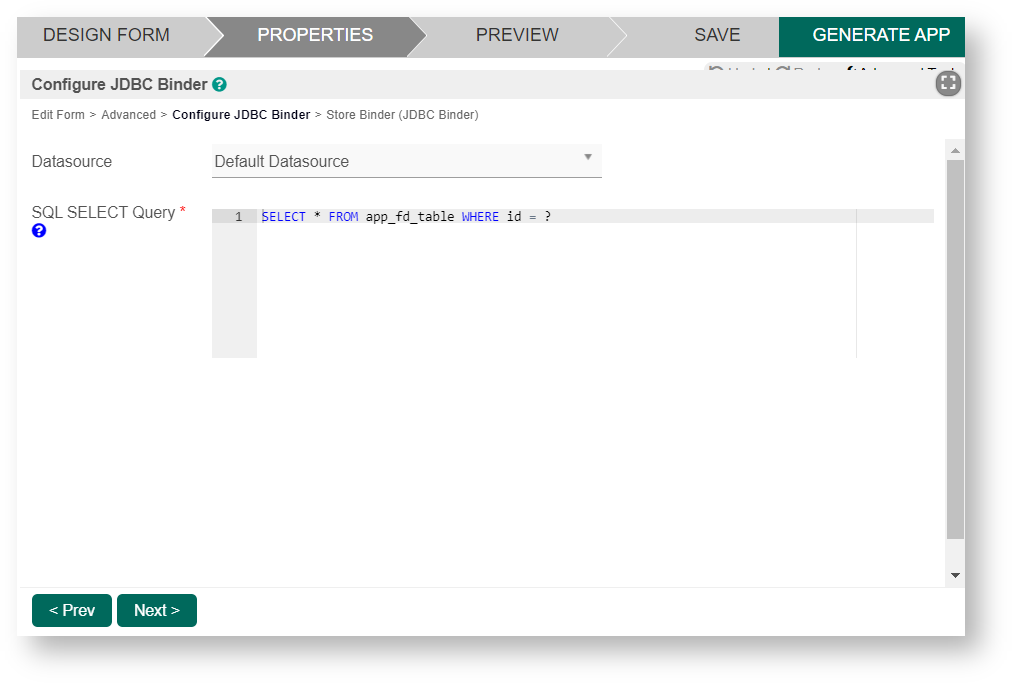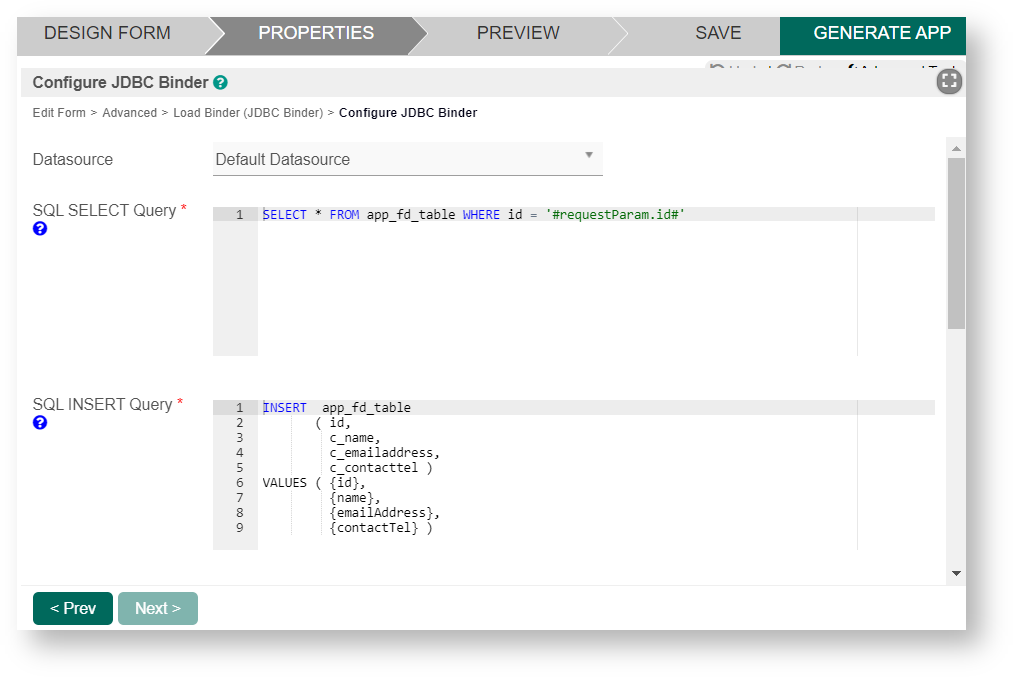Introduction
JDBC Form Binder allows you to use custom SQL statements to retrieve and load records into your form fields. Similarly, you can write SQL statements to save the records in your form field into a database table.
JDBC form binders settings are located in the form PROPERTIES tab under "Advanced > Data Binder > Load Binder & Store Binder". JDBC form binders replaces the standard Workflow Form Binder.
In a load binder, you only need to configure the datasource and SELECT query. In a store binder, you will need to write SQL statements for SELECT, INSERT, UPDATE, and DELETE database actions.
JDBC form binders have the following exception where this binder cannot be used (revert back to Workflow Form Binder):
- Use of form element workflow variables. JDBC form binders will not populate or update the workflow variables.
- Use of file and image attachment field elements. JDBC form binders will not handle the file retrieval or file transfer into Joget file storage.
JDBC Binders comes standard in Joget v6 and DX. If you are using Joget v5, you can download the JDBC Binders from Joget Marketplace.
JDBC Binder Properties
Configure JDBC Load Binder
| Name | Description | Screens (Click to view) |
|---|---|---|
| Datasource |
By selecting Default Datasource, the database your Joget is currently using will be selected. (See Figure 2). |
|
| Custom JDBC Driver | Custom JDBC Driver. This field is required when Custom Datasource is selected in Datasource above. Example: com.mysql.jdbc.Driver | |
Custom JDBC URL | Custom JDBC URL. This field is required when Custom Datasource is selected in Datasource above. | |
Custom JDBC Username | Custom JDBC Username. This field is required when Custom Datasource is selected in Datasource above. | |
Custom JDBC Password | Custom JDBC Password. This field is required when Custom Datasource is selected in Datasource above. Test the connection parameters Click on the "Test Connection" button at the bottom of the page to quickly test out your configurations. | |
| SQL SELECT Query for Load Binder | The SQL query specific to your database type (MySQL, MSSQL, Oracle, etc.). Use question mark ? in your query to represent the primary key or foreign key. Example SELECT * FROM app_fd_table WHERE id = ? If a column name contains reserved keywords, do ensure it is encapsulated properly. For example for MySQL, if the column identifier itself contains a dot symbol ( . ), it should be encapsulated like this: SELECT `myAppName.myColumn` FROM app_fd_myTable; Table & Column Naming
| |
Handling for field workflow variable? | Click to select if you are using workflow variables mapping in your form elements. Not applicable for grid elements. | Note: For Joget versions v5 and v6, kindly note that the JDBC load/save binders cannot be used if your form or form grid has file or image attachment field elements or if you are using workflow variables mappings in your form elements. Default to Multirow Form Binder. |
Handling for uploaded files? | Click to select if you are using file or image attachments in your form elements. |
Configure JDBC Store Binder
If a column name contains reserved keywords, do ensure it is encapsulated properly.
For example for MySQL, if the column identifier itself contains a dot symbol ( . ), it should be encapsulated like this:
SELECT `myAppName.myColumn` FROM app_fd_myTable;
| Name | Description | Screens (Click to view) |
|---|---|---|
| Store Binder | JDBC Binder selected (See Figure 1). |
|
| Datasource |
By selecting Default Datasource, the database your Joget is currently using will be selected. (See Figure 3). | |
| Custom JDBC Driver | Custom JDBC Driver. This field is required when Custom Datasource is selected in Datasource above. Example: com.mysql.jdbc.Driver | |
Custom JDBC URL | Custom JDBC URL. This field is required when Custom Datasource is selected in Datasource above. Example: | |
Custom JDBC Username | Custom JDBC Username. This field is required when Custom Datasource is selected in Datasource above. | |
Custom JDBC Password | Custom JDBC Password. This field is required when Custom Datasource is selected in Datasource above. Test the connection parameters Click on the "Test Connection" button at the bottom of the page to quickly test out your configurations. | |
| SQL SELECT Query for store binder | The SQL query specific to your database type (MySQL, MSSQL, Oracle, etc.). Use syntax like {field_id} in query to inject submitted form data. Example SELECT
*
FROM
app_fd_table
WHERE
id = {id}
Note: If you use JDBC in a form grid or spreadsheet for load or save binder, be advised the SQL syntax is different from form load or save binder. Kindly download and view the sample app for JDBC in a form grid or spreadsheet. | |
| SQL INSERT Query | Use syntax like curly brackets {field_id} in query to inject submitted form data. Example INSERT app_fd_table
(id,
c_name,
c_emailaddress)
VALUES ({id},
{name},
{emailAddress})
You can use {uuid} to tell Joget to create a random unique id or a "Universally unique identifier". Example: Example INSERT app_fd_table
(id,
c_name,
c_emailAddress
VALUES ({uuid},
{name},
{emailAddress})
For JDBC SQL INSERT in a grid, use "{foreignKey}" syntax to populate the parent id into the child table foreign key value, as follows: INSERT app_fd_table_child (
id,
c_name,
c_fk)
VALUES (
{uuid},
{name},
{foreignKey})
| |
| SQL UPDATE Query | Use syntax like curly brackets {field_id} in query to inject submitted form data. Example UPDATE app_fd_table
SET id = {id},
c_name = {name},
c_emailaddress = {emailAddress},
c_contacttel = {contactTel}
WHERE id = {id}
| |
| SQL DELETE Query | SQL statement to delete form data records in Datalist/Grid element. Use syntax like curly brackets {id} in query to inject form data primary key value. Example DELETE
FROM
app_fd_table
WHERE
id = {id}
| |
| Handling for field workflow variable? | Click the checkbox if you are using workflow variables mapping in your form elements. The JDBC binder will copy the field value to the workflow variable when you submit the form if the form is mapped to a process. Not applicable to grid elements. | Note: For Joget versions v5 and v6, kindly note that the JDBC load/save binders cannot be used if your form or form grid has file or image attachment field elements or if you are using workflow variables mappings in your form elements. Default to Multirow Form Binder. |
Handling for uploaded files? | Click the checkbox if you are using file or image attachments in your form elements. The JDBC binder will save your file or image attachment into the ".\wflow" folder when you save the form. Select form to store uploaded files only if you are using a form grid or spreadsheet. |
Understanding JDBC Errors
| Error Messages | Causes And Solutions |
|---|---|
| Message on screen: Record cannot be found | There is a JDBC configuration error. Check the joget.log file for more information. |
| The rest of the error messages below are found in the \apache-tomcat-x.x.xx\logs\joget.log file. | |
| ERROR org.joget.plugin.enterprise.JdbcLoadBinder - org.apache.commons.dbcp.SQLNestedException: Cannot load JDBC driver class | The property Custom JDBC Driver is incorrect |
| ERROR org.joget.plugin.enterprise.JdbcLoadBinder - org.apache.commons.dbcp.SQLNestedException: Cannot create PoolableConnectionFactory (Could not connect to address=(host=localhost)(port=3306)(type=master) : Socket fail to connect to host:localhost, port:3306. Connection refused: connect) | The property Custom JDBC URL is incorrect |
| ERROR org.joget.plugin.enterprise.JdbcLoadBinder - org.apache.commons.dbcp.SQLNestedException: Cannot create PoolableConnectionFactory (Could not connect to address=(host=localhost)(port=3307)(type=master) : Access denied for user 'xxxx'@'localhost' (using password: YES) | The property Custom JDBC Username or Custom JDBC Password is incorrect. |
ERROR org.joget.plugin.enterprise.JdbcLoadBinder - java.sql.SQLSyntaxErrorException: ..... | The property SQL SELECT Query is incorrect. Do also check the SQL lower or upper case spelling on table and column names, especially if you are running a database on a Linux OS which is case sensitive. |
| ERROR org.joget.plugin.enterprise.JdbcLoadBinder - java.sql.SQLException: Could not set parameter at position 1 (values was '?') Query - conn:506(M) - SELECT * FROM app_fd_table WHERE id = "?" | Do not enclosed the ? in single or double quotation marks. Correct syntax is ? : SELECT * FROM app_fd_table WHERE id = ? |
ERROR org.joget.tutorial.JdbcOptionsBinder - com.microsoft.sqlserver.jdbc.SQLServerException: | DB error on JDBC Options with "Field ID to control available options based on Grouping". You can only pass one ? parameter in the SQL. |
Related JDBC Binders
Download Demo Apps
- Demo app using JDBC Form Binders for MySQL database: APP_jdbc_load_store_form_binder_dx_kb.jwa
- Demo app using JDBC Form Grid Binders for MySQL database: APP_form_grid_with_jdbc_binder.jwa
- Demo app using JDBC in List Grid for MySQL database: APP_list_grid_multirow_jdbc_dx_kb.jwa
- Demo app using JDBC Form Binders for Oracle database: APP_example_form_jdbc_on_oracle_v6.jwa
- Demo app using JDBC Form Grid Binders for Oracle database: APP_jdbc_form_grid_oracle_dx_kb.jwa


